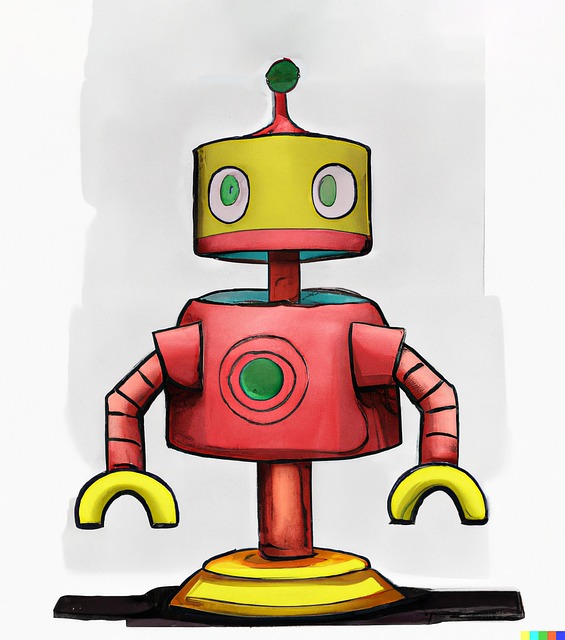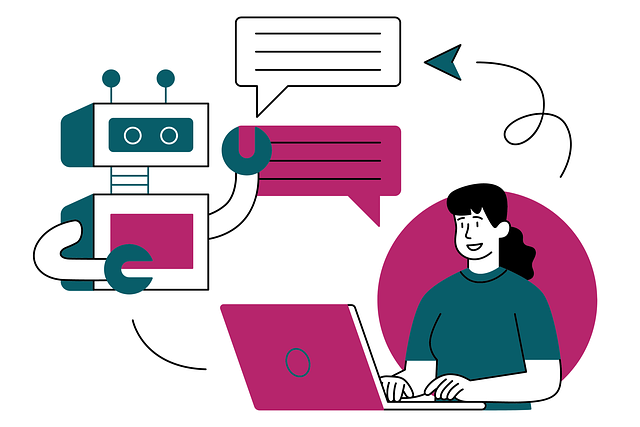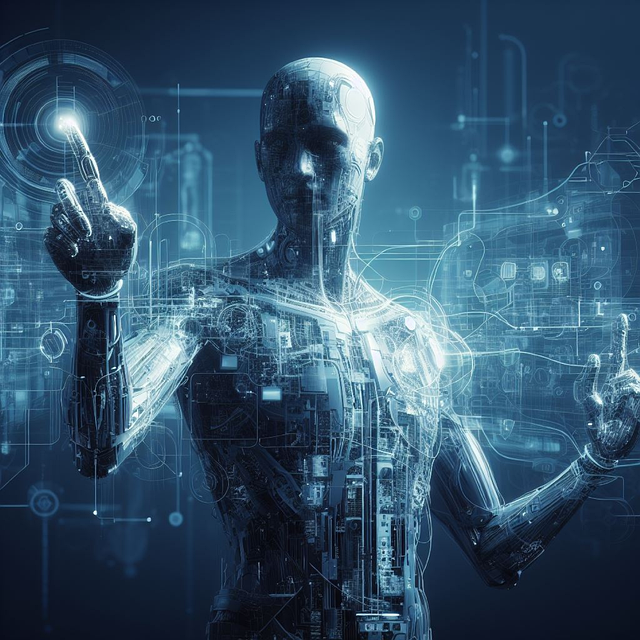AI chatbots have transformed digital communication by offering personalized support and information retrieval through sophisticated conversations. Driven by advances in natural language processing (NLP), these virtual assistants understand context, intent, and language nuances to provide human-like responses. Their impact is widespread, from e-commerce product recommendations to healthcare symptom checks, automating tasks and enhancing user satisfaction. As AI chatbot technology evolves, their influence will deepen, reshaping digital interactions with round-the-clock availability and continuous learning. Ethical considerations, including transparency, data privacy, and bias mitigation, are crucial as these chatbots integrate into daily routines across sectors, revolutionizing customer service and opening avenues for new business models centered around AI-driven interactions.
In the rapidly evolving digital landscape, AI-powered conversations are reshaping how we interact with technology. This article delves into the transformative power of AI chatbots, exploring their impact on user experiences and the seamless integration they offer. We dissect the technological backbone of Natural Language Processing (NLP) and uncover the ethical considerations in chatbot development. Furthermore, it examines the current and future implications of these innovative tools, highlighting their potential to redefine digital interactions. Discover how AI chatbots are becoming an integral part of our daily lives.
- The Rise of AI Chatbots: Transforming Digital Communication
- How AI-Powered Conversations Enhance User Experiences
- Natural Language Processing: The Brain Behind Conversational AI
- Ethical Considerations in AI Chatbot Development
- Integrating AI Chatbots into Everyday Life
- Future Implications: AI's Ongoing Impact on Digital Interactions
The Rise of AI Chatbots: Transforming Digital Communication

The rise of AI chatbots has undeniably transformed digital communication, ushering in a new era of interactive experiences. These intelligent virtual assistants are no longer mere tools for basic customer service; they’ve evolved to engage users in complex conversations, offering personalized support and information retrieval. With advancements in natural language processing (NLP), ai chatbots can now understand context, interpret nuances, and generate human-like responses.
This shift is evident across various sectors, from e-commerce platforms providing instant product recommendations to healthcare services offering preliminary symptom checks. The integration of AI chatbots not only enhances user satisfaction but also streamlines operations by automating repetitive tasks. As technology continues to refine these virtual agents, their impact on digital interactions will only grow more profound, reshaping the way we communicate and access information in the digital age.
How AI-Powered Conversations Enhance User Experiences

AI-powered conversations are revolutionizing digital interactions, significantly enhancing user experiences. These advancements, driven by sophisticated AI chatbots, enable more natural and personalized dialogues compared to traditional interfaces. By understanding context, intent, and nuances in human language, AI chatbots can provide tailored responses, cater to individual needs, and offer assistance with remarkable efficiency.
This evolution is particularly evident in customer service domains where AI chatbots handle a multitude of queries, from simple FAQs to complex issue resolution. They ensure round-the-clock availability, instant response times, and consistent quality of support, thereby improving user satisfaction and fostering stronger brand loyalty. Moreover, these chatbots learn and adapt over time, leveraging vast datasets to continuously refine their capabilities, creating an ever-improving user experience.
Natural Language Processing: The Brain Behind Conversational AI

Natural Language Processing (NLP) is the lifeblood of AI-powered conversations, enabling machines to understand and interpret human language. This complex field focuses on the interaction between computers and humans through natural language, allowing ai chatbots to grasp nuances, context, and sentiment in our queries. By analyzing text and speech data, NLP algorithms can generate responses that are coherent and contextually relevant.
The heart of these conversations lies in sophisticated models that learn from vast datasets, mimicking human cognitive abilities. These models power interactive ai chatbots, ensuring they can engage in meaningful dialogues, answer questions accurately, and even offer personalized recommendations. With continuous advancements in NLP, the future of digital interactions looks set to be shaped by more intelligent, responsive, and human-like conversations.
Ethical Considerations in AI Chatbot Development

As AI chatbots become more integrated into our digital interactions, ethical considerations in their development and deployment are paramount. One key concern is ensuring transparency and honesty in chatbot responses. Users should be clearly informed when they are interacting with an AI to avoid misunderstandings or false trust. Privacy and data security are also critical issues, as these systems often process sensitive user information. Developers must implement robust measures to safeguard personal details from unauthorized access or misuse.
Additionally, bias in AI chatbots is a significant challenge that requires careful attention. These systems learn from vast datasets, which can inadvertently perpetuate existing societal biases if not carefully curated and monitored. Creating diverse training data sets and employing methods to identify and mitigate bias during development are essential steps toward fostering fair and equitable digital experiences for all users.
Integrating AI Chatbots into Everyday Life

AI chatbots are seamlessly integrating into our everyday lives, transforming how we interact with technology. From customer service to personal assistants, these intelligent agents are becoming an indispensable part of our digital landscape. Chatbots offer 24/7 availability, instant responses, and personalized interactions, enhancing user experiences across various sectors.
Whether it’s answering basic queries on e-commerce sites or providing complex support in healthcare settings, AI chatbots are designed to understand and respond to human language nuances. As technology advances, these bots become increasingly sophisticated, capable of handling more intricate tasks and fostering deeper levels of engagement with users.
Future Implications: AI's Ongoing Impact on Digital Interactions

As AI chatbots continue to evolve, their impact on digital interactions will only grow more profound. Beyond simply providing quick answers or handling basic tasks, these intelligent assistants are poised to become seamless integrals within our daily online routines. Imagine a future where personalized AI chatbots anticipate your needs, offer insightful recommendations, and facilitate complex processes with intuitive understanding. They could revolutionize e-commerce by offering tailored product suggestions, transform customer service through proactive support, and enhance content consumption by curating personalized news feeds or entertainment recommendations.
The ongoing development of AI technology promises to reshape how we engage with digital platforms. As these chatbots become more sophisticated in processing natural language, context awareness, and emotional intelligence, they will enable richer, more human-like conversations. This evolution may lead to increased accessibility for individuals with diverse needs, improved user experiences across various sectors, and even the emergence of new digital business models centered around AI-driven interactions.






